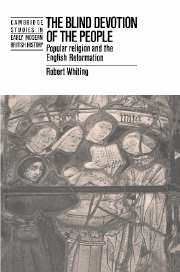Book contents
- Frontmatter
- Contents
- List of illustrations
- Preface
- Note
- 1 Introduction
- 2 Survey
- PART ONE ASSESSMENT
- PART TWO EXPLANATION
- 8 Spiritual motivations: Lutheranism, Calvinism and other faiths
- 9 Non-spiritual motivations: politics, economics and other forces
- 10 Mediate influences: literature, drama and art
- 11 Immediate influences: example, action and oral communication
- 12 Summation of Part Two
- 13 Perspective
- Appendix 1 Maps
- Appendix 2 Graphs
- Bibliography and abbreviations
- Index
11 - Immediate influences: example, action and oral communication
Published online by Cambridge University Press: 11 December 2009
- Frontmatter
- Contents
- List of illustrations
- Preface
- Note
- 1 Introduction
- 2 Survey
- PART ONE ASSESSMENT
- PART TWO EXPLANATION
- 8 Spiritual motivations: Lutheranism, Calvinism and other faiths
- 9 Non-spiritual motivations: politics, economics and other forces
- 10 Mediate influences: literature, drama and art
- 11 Immediate influences: example, action and oral communication
- 12 Summation of Part Two
- 13 Perspective
- Appendix 1 Maps
- Appendix 2 Graphs
- Bibliography and abbreviations
- Index
Summary
The religious attitudes of the layman were shaped not only by his exposure to mediate influences, particularly literature, drama and art, but also by his experience of direct contact with a wide variety of individuals and social groups.
In many cases a powerful influence was undoubtedly exerted by his family in general and by his parents in particular. Several members of one family might be simultaneously active in the religious life of their parish: examples include the Noseworthies at Chagford and the Rumbelows at Morebath. Familial influences are discernible also among the Catholic extremists in 1548–9. In 1548 the Cornish rioters included John and William Kilter, both of Constantine; Alan and Richard Rawe, of Gwennap and St Keverne; John Tribo the elder and John Tribo the younger, both of St Keverne; and James and John Tregena, the former of St Keverne. The power of parental training was evident also among the traditionalists at Exeter in 1549: Hooker sneered that these rejected ‘any other religion than that as they were first nozzled [i.e. suckled] in’. The rebels of this year indeed demanded a return to the religious practices of ‘our forefathers’.
At the same time, however, anti-Catholic attitudes might also be propagated by means of the family. Protestant parents, including Thomas Bennett, John Budleigh, Robert Kede, Philip Nichols, and their respective wives, seem frequently to have successfully transmitted their religious convictions to their offspring.
- Type
- Chapter
- Information
- The Blind Devotion of the PeoplePopular Religion and the English Reformation, pp. 211 - 258Publisher: Cambridge University PressPrint publication year: 1989



